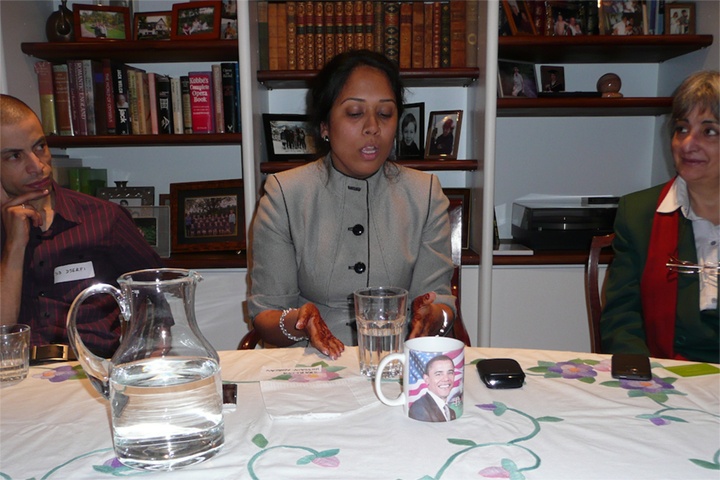Alumni Spotlight: Sharlina Hussain-Morgan '07
On a diplomatic mission

Photo from a roundtable discussion with Sharlina Hussain-Morgan '07 in London
Right from the start, Sharlina Hussain-Morgan '07 dispels any romantic notions about her job: As a foreign service officer at the U.S. Embassy in London, she does not frequent black tie galas, or deal with undercover members of Her Majesty's Secret Service. While she "schmoozes with important people on occasion" (think princes and prime ministers), she spends most of her time "talking to ordinary people about what they think of Americans."
Although Hussain-Morgan's work is "definitely not glamorous," she nevertheless finds it "incredibly rewarding." This summer, as London prepared to host the Olympics, she was finalizing details of a basketball match between the U.S. Olympic team and children from economically depressed Manchester. Soon after, she was sending a delegation of U.K. youth to the U.S. for an intimate look at American election year politics, including the Democratic National Convention.
Many of her young contacts "are utterly surprised at seeing a south Asian woman from America as a diplomat, especially someone from my background." Hussain-Morgan has found that her own biography powerfully supports her diplomatic mission. She often tells audiences, "I'm here because of the American dream my parents pursued."
Bangladeshi immigrants, her parents came to the U.S. with an "aspirational spirit." They struggled economically, managing a candy shop, and then a motel in upstate New York, where Hussain-Morgan and her brother were both expected to pitch in at the registration desk and cleaning rooms. "It was not an easy upbringing," she recalls.
The overriding concern for the Hussains was their children's education. "My parents used every penny to put my brother and me through private school, and to aim for the best universities," she says. Her mother, who had entered an arranged marriage with no education, wanted opportunities for Sharlina that had not been available to her. "My mother's wish that she had done more with her life had an effect on me. I came to care a lot about women's rights."
As much as her goals were shaped by her parents' expectations, Hussain-Morgan notes another climactic influence: the 9/11 attacks. As one of few Muslim families in their community, they felt "condemned," and the teenage Hussain-Morgan "took it to heart – catapulted into a hyperawareness of my identity."
But paradoxically, 9/11 had a positive impact on her as well. Hussain-Morgan developed an intense curiosity about a world in which such attacks could happen, and decided to study international politics in college. Encouraged by a math teacher, she applied to MIT, after a high school internship in Hillary Clinton's New York Senate office, and with the help of an admissions essay on Noam Chomsky.
MIT proved "liberating – the best four years of my life," says Hussain-Morgan. While taking classes in political theory, which "make so much more sense now," she engaged in a range of extracurricular activities, from student government to south Asian dance shows, deliberately pushing herself to meet students outside of her major. She made a "point of linking up friends" from MIT's diverse student cultures. "I felt I was a bridgemaker."
As a public diplomacy officer, she is "on Cloud 9," even when venturing into British Muslim communities often quite hostile to the U.S. Hussain-Morgan hopes her work is changing anti-American attitudes. "It's a good use of taxpayer dollars to create more engaged foreign citizens who don't see Americans just as dumb people into hip-hop." As a Bangladeshi-American embassy officer, she can persuasively demonstrate that "America is diverse, and that you can be anything you want to be."